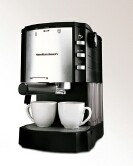Caffeine May Block High Cholesterol Linked to Alzheimer's
Its ability to stabilize blood-brain barrier may play role in neurological therapies.
|
E-mail this article
Subscribe to news
Printer friendly version
|

(SOURCE: BioMed Central, news release, April 2, 2008
)
WEDNESDAY, April 9 (HealthDay News) -- A little caffeine every day could offer some protection from Alzheimer's disease for people with high cholesterol.
Rabbits given the daily caffeine equivalent of one cup of coffee and fed a cholesterol-rich diet for 12 weeks suffered relatively little damage in their blood-brain barrier (BBB), which protects the central nervous system from the rest of the body's circulation, new research found.
The findings were published in the open-access publication Journal of Neuroinflammation.
Previous studies have shown that high levels of cholesterol break down the BBB, exposing the central nervous system to damage from blood-borne contamination. BBB leakage occurs in a variety of neurological disorders such as Alzheimer's disease.
"High levels of cholesterol are a risk factor for Alzheimer's disease, perhaps by compromising the protective nature of the blood-brain barrier. For the first time, we have shown that chronic ingestion of caffeine protects the BBB from cholesterol-induced leakage," Jonathan Geiger, of the University of North Dakota School of Medicine and Health Sciences, said in a prepared statement.
Caffeine appears to offer protection by helping proteins maintain the tight binding of the cells in the BBB, so they stop unwanted molecules from entering the central nervous system.
The findings also confirm previous studies showing that caffeine protects against memory loss in aging and in Alzheimer's disease.
"Caffeine is a safe and readily available drug, and its ability to stabilize the blood-brain barrier means it could have an important part to play in therapies against neurological disorders," Geiger said.
More information
The U.S. National Institute on Aging has more about Alzheimer's medications.
Copyright © 2008 ScoutNews, LLC. All rights reserved. 
HealthDayNews articles are derived from various sources and do not reflect federal policy. healthfinder.gov does not endorse opinions, products, or services that may appear in news stories. For more information on health topics in the news, visit the healthfinder.gov health library.